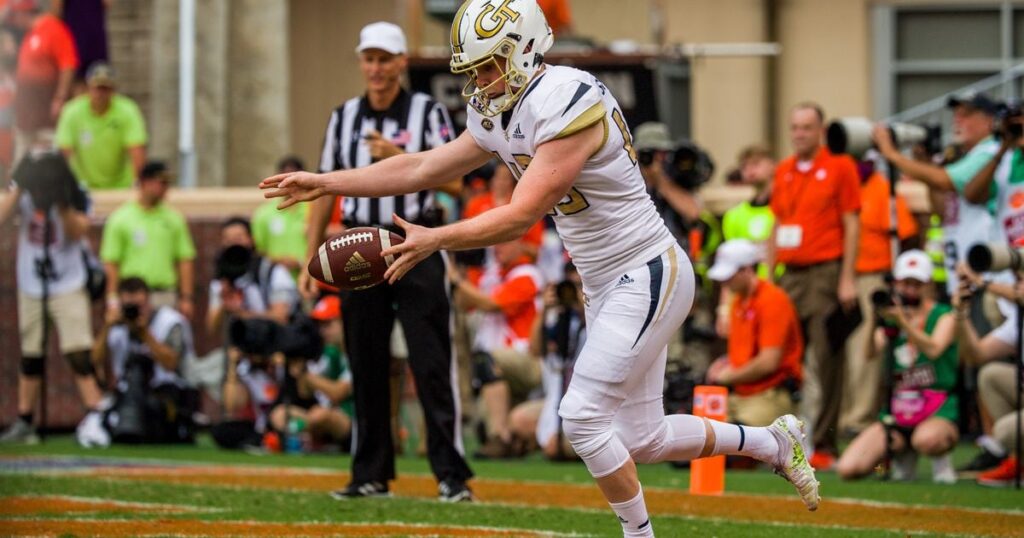“The mechanics of the swing, when the ball is directly on the turf, you have to have your foot at the perfect angle to perfectly navigate the turf to get the result you want. We've been doing that since we could walk,” Reeder says. “Connecting the kicking motion to get your foot on the ball is the hardest part. What shape is your foot in when it makes contact with the ball?”
“Most of the players come to me with that part, or pretty close to it, so they're way ahead of the curve. Because of our sport, we actually have that even though no one else in the world is playing it. So the eyes of the NFL and college football have been opened in the last 12-18 months.”
Reeder runs Reeder Kicking, an Ireland-based academy he founded that aims to create a pathway for Irish athletes to pursue a college education in the U.S. It's a path Reeder hadn't taken before, and one he realized could have changed his life if he'd been introduced to football three years earlier.
But until then, the only reference points for Reeder in American football were the movies “Any Given Sunday” and “The Waterboy.” It wasn't until the COVID-19 pandemic hit that Reeder picked up an American football uniform and started playing with a foreign ball.
“Somebody told me to take three steps and that was it. I went for a 58, 59-yard field goal,” he said. “Somebody asked me, 'Who are you playing for?' I said, 'Nobody.'”
Reeder began taking punting and placekicking seriously, but a little too late to make an NFL roster. He earned playing time in European leagues and the Canadian Football League, but it was hard to sell a kicker in his late 20s with little experience to professional owners and general managers.
So Reeder returned to Ireland and his hometown of Galway and began a career in finance and also began coaching football on the side, and as his reputation grew, the NFL asked Reeder to become their international punting and kicking coach.
All the while, he was gaining a greater understanding of what it meant to play college football in the United States.
“It was so clear to me. This is the pinnacle of college football in America,” Reeder said. “I talked to the players and found out what it means to be a Division I college athlete, and I thought, 'This is phenomenal. It's like playing in the English Premier League.' And we can do it. We just need a pathway.”
“My journey didn't have a path, so I thought I'd connect the dots here and give it a go. And I really enjoy coaching. It wasn't a question of if I wouldn't do this, it was a question of when. It was very purposeful.”
Reeder supported several others, including Smith, Idaho State punter Ross Bolger and former Rutgers punter Jude McAtamney (now with the New York Giants), and they saw almost immediate success. Reeder also spoke with Georgia Tech punter David Shanahan, a Castleisland, Ireland native, about his experience and what brought the Tech senior to the U.S.
Rieder said he currently has a database of about 1,000 names of young kickers across Europe hoping to land their big break in the United States.
“This year (the NFL Scouting Combine) was the first year they had a specialist combine. We had three kickers and two punters,” Reeder said. “You talk to every coordinator and their general reaction was like, 'Wow, these kids deserve to be here. I didn't think they'd be comparable to the top seven kickers in college football.' We knew we were better than they thought we were, but they didn't have a benchmark.”
Reeder plans to attend Tech's season opener, the Yellow Jackets taking on Florida State University at Aviva Stadium in Dublin, Ireland, on Aug. 24. In fact, his participation in the Irish Kicking King competition leads into that game, serving as a nexus between his efforts to introduce college football to Ireland and Europe and to broaden the appeal of the sport.
There's a good chance the next Irish kicker stars, like Shanahan or Smith, will be in the mix that day.
“It exposes people to what college football is, the magnitude of it. It highlights how big a sport it is, how many resources there are, how passionate people are about it, and now we're showing them how to access it,” Reeder said. “It's a really great synergy.”

